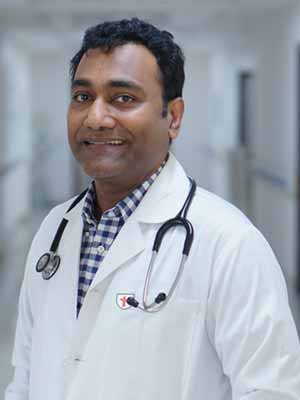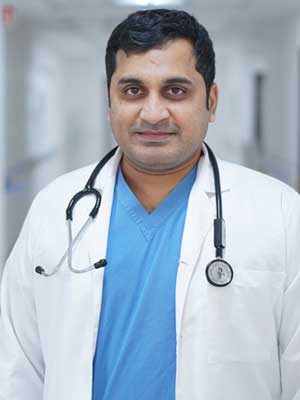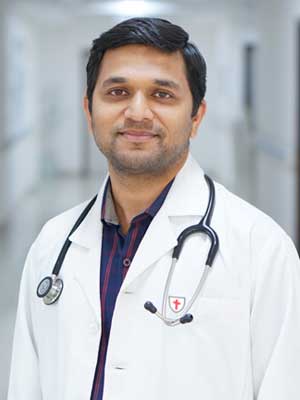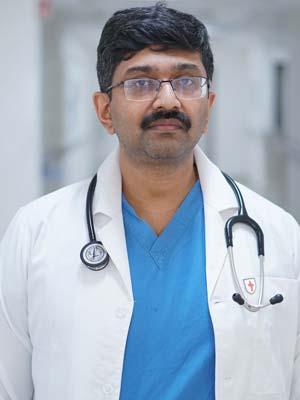Overview
Anaesthesiology is a dynamic field, continually evolving to adapt to the complexities of modern healthcare. Our department at Believers Hospital is at the forefront of this change, committed to providing safe, compassionate, and patient-centered care. As the demands for clinical practice management skills increase, we stand ready to meet the challenges with expertise and innovation.
What Sets Us Apart
Every year, we oversee more than 6500 procedures in our 14 state-of-the-art operating rooms, catering to a diverse range of medical and surgical needs across the hospital. We also take pride in our role as educators, training both medical students (undergraduate MBBS and postgraduate MD Anaesthesiology) and allied health students (Diploma in OT and Anaesthesia technology). Our accomplished faculty is well-versed in Competency-Based Medical Education, ensuring that our students receive the highest quality training.
In addition to our clinical and educational pursuits, we are actively involved in multiple research projects and participate in international multicentric research trials.
Services
The Department of Anaesthesia offers expert care for a wide spectrum of medical and surgical procedures. Our faculty members are renowned experts in their respective fields, with extensive training in areas such as regional blocks, difficult airway management, interventional pain, and intensive care. Many have received training at some of the top medical centres in India and abroad, making our department a leader in quality care in the region.
We follow the Enhanced Recovery after Surgery (ERAS) protocol for complex surgical procedures, contributing to clinical improvement and cost benefits for the healthcare system. Our proficiency in regional anaesthesia techniques enables us to safely serve patients with complex co-morbidities who may otherwise be deemed unfit for surgery and anaesthesia.
Our Preoperative and Postoperative Care
We've designed a fully equipped preoperative bay that facilitates preoperative preparation, patient optimization, and minor procedures. Here, we perform regional anaesthetic blocks, placement of intravascular and intra-arterial lines, and premedication administration, ensuring that patients can be transported smoothly to the operating suites.
In our spacious and well-equipped post-operative anaesthesia care unit, patients receive careful monitoring and care until they meet the discharge criteria. Patients undergoing prolonged and complex surgeries are nursed here for extended periods. Our expert pain interventionalists manage post-operative pain by administering regional blocks and specific pain infusions, ensuring that patients are comfortable and well-cared for during their recovery.
Cutting-Edge Technology
We take pride in being one of the few hospitals in South India with an MRI-compatible anaesthesia workstation. This allows us to provide safe anaesthesia during MRI scans for all patients, including infants and children.
Interventional Pain Services
Our expert interventional Pain Specialist is available during working hours on all weekdays, with outpatient services offered once a week. These services focus on relieving intractable and chronic pain, enabling patients to return to their routine activities with improved quality of life.
We have successfully managed pain conditions, including chronic lower back pain, sciatica, neck pain, joint pain, arthritis, headaches, neuralgic pain, post-herpetic neuralgia, trigeminal neuralgia, fibromyalgia, migraine, and cancer pain, using a range of pharmacological interventions, RFA, epidural injections, percutaneous discectomies, facet and sacroiliac joint injections.
Besides, we offer patient care including
- Pre-Anaesthesia Clinic: You'll receive a comprehensive medical history evaluation, assessing any medical issues and determining the need for further laboratory tests or consultations before proceeding with surgery.
- Anaesthesia Options: Based on the nature of your surgery and your medical condition, we'll determine the most suitable anaesthesia option for you. We take your preferences into account whenever possible.
- Procedure Preparation: Once you're deemed fit for the procedure, we'll provide instructions related to fasting and medications.
- Post-Surgery Care: If you're recovering in one of our Intensive Care Units or if our Acute Pain Service is consulted for assistance, our anaesthesia physicians will continue to care for you during your recovery. At the Department of Anaesthesiology at Believers Hospital, we're committed to your well-being and comfort throughout your entire healthcare journey. Your safety and satisfaction are our top priorities.
Specialists
FAQ
Common side effects include headache, pain at the injection site, and nausea and vomiting. Many of these risks are mitigated through our anesthetic approaches, more specifically regional anesthesia.
General anesthesia today is safer and more effective than ever before, often resulting in a faster recovery. In addition, many procedures that until only recently required general anesthesia can now be performed using regional pain control, which can make recovery even easier.
At Believers Church Medical College post-operative anaesthesia care unit, patients receive careful monitoring and care until they meet the discharge criteria. Our expert pain interventionalists manage postoperative pain by administering regional blocks and specific pain infusions, ensuring that patients are comfortable and well-cared for during their recovery.
You may be drowsy for the first 30 minutes after the anesthesia wears off. Most people recover quickly, but it can vary. Patients only leave the recovery room if they are fully awake without any pain or particular discomfort.
The length of time in the recovery room varies depending on the type of anesthesia, the type of surgery and the patient’s history:
- After sedation, patients stay in the recovery room at least 45 minutes.
- After general anesthesia, patients stay for at least an hour.
- After spinal anesthesia, patients stay until their legs are free to move again.
- After loco-regional anesthesia, the duration varies depending on the region blocked.
If you're recovering in one of our Intensive Care Units, our anaesthesia physicians of Believers Church Medical College Hospital will continue to care for you during your recovery.
In general, anesthesia is considered safe, and most people can undergo multiple procedures with anesthesia without any long-term adverse effects. However, each time you undergo anesthesia, there is a small risk of side effects or complications such as nausea, vomiting, sore throat, headache, or confusion.
News & Events
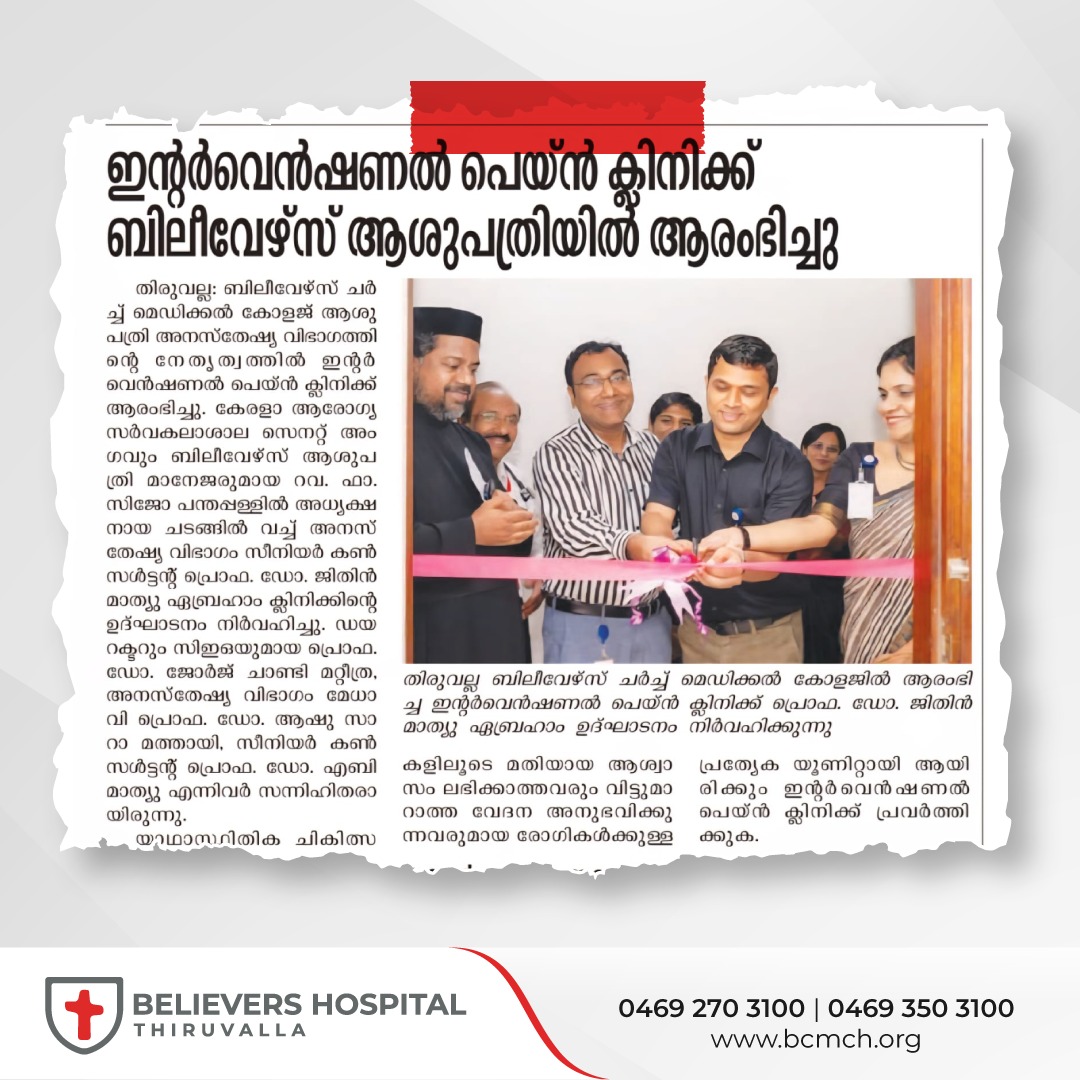
The Interventional Pain Clinic, under the leadership of the Department of Anaesthesia, has commenced operations…
View this Post

Believers Hospital, in collaboration with the Anesthesia Department and the Thiruvalla branch of the Indian…
View this Post
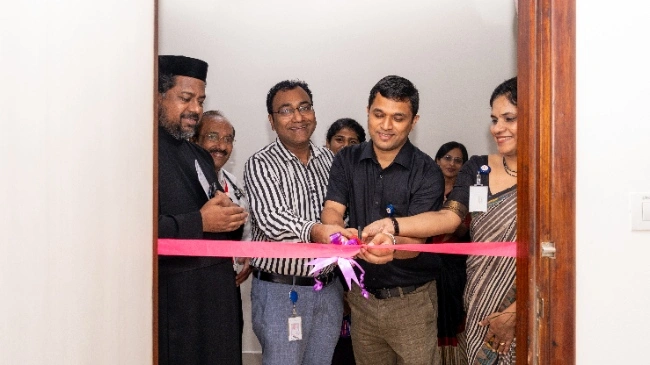
The Interventional Pain Clinic, under the leadership of the Department of Anaesthesia, has commenced…
View this Post

